Profile: Emeritus Pope Benedict XVI
- Published
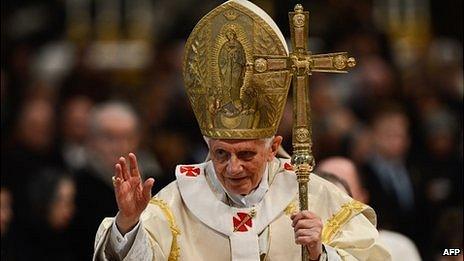
Following his shock resignation in February, Emeritus Pope Benedict XVI has officially retreated to the converted Mater Ecclesiae convent, where he will dedicate himself to a life of private prayer in the service of the Church.
He caught the world by surprise when he announced on 28 February he would stand down as head of the Catholic Church.
Benedict became the first Pope to resign in 600 years.
Speaking in Latin, the 85-year-old told cardinals in Rome that his "strengths due to an advanced age are no longer suited" to the role.
The Vatican has rejected speculation that the former pope is unwell.
Two months after his resignation, he was flown by helicopter from the Castel Gandolfo papal summer residence to Vatican City, where he was welcomed by his successor, Pope Francis.
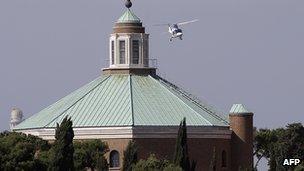
Emeritus Pope Benedict arrived by helicopter in Vatican City to begin his life in the monastery
Emeritus Pope Benedict will now spend the rest of his days in the convent just behind St Peter's Basilica, with his personal secretary, Monsignor Georg Gaenswein.
'Sin within'
The last pope to resign was Pope Gregory XII in 1415.
In the Middle Ages, Pope Celestine V abdicated in 1294, after only five months as pontiff. He died nearly two years later as a hermit.
A clause in Church Canon Law stipulates that a papal resignation is valid if the decision is made freely and manifested properly.
At 78, Benedict XVI was one of the oldest new popes in history when he was elected in 2005.
A piano-playing professor, Cardinal Joseph Ratzinger was looking forward to retirement when Pope John Paul II died in 2005. He has said he never wanted to be Pope.
If he or any of the cardinals who elected him imagined a brief, uneventful reign, paving a transition to a new era, they were to be disappointed.
Benedict took the helm as one of the fiercest storms the Catholic Church has faced in decades - the scandal of child sex abuse by priests - was breaking.
The flood of allegations, lawsuits and official reports into clerical abuse, which reached a peak in 2009 and 2010, may be the defining episode of his pontificate.
The most damaging claims for the Church have been that local dioceses - or even the Vatican itself - were complicit in the cover-up of many of the cases, prevaricating over the punishment of paedophile priests and sometimes moving them to new postings where they continued to abuse.
While some senior Vatican figures initially lashed out at the media or alleged an anti-Catholic conspiracy, the Pope has insisted that the Church accept its own responsibility, pointing directly to "sin within the Church".
Shortly before his election in 2005, he lamented: "How much filth there is in the Church, and even among those... in the priesthood."
He has met and issued an unprecedented apology to victims, made clear that bishops must report abuse, and introduced fast-track rules for defrocking abusive priests.
Before his papacy Cardinal Ratzinger spent 24 years as a senior figure in the Vatican, heading the Congregation for the Doctrine of the Faith - once known as the Holy Office of the Inquisition.
It earned him the nickname "God's Rottweiler", and played to his passion for Catholic doctrine.
His high office gave him ultimate oversight of a number of clerical abuse cases.
Critics say he did not grasp the gravity of the crimes involved, allowing them to languish for years without proper attention. He has never publicly given his own version of events.
His backers, however, say he did more than any other pope to confront abuse.
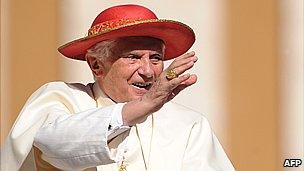
Benedict has carried his love of fine clothes to the Vatican
Formative experiences
Joseph Ratzinger was born into a traditional Bavarian farming family in 1927, although his father was a policeman.
The eighth German to become Pope, he speaks many languages and has a fondness for Mozart and Beethoven.
He was said to have admired the red robes of the visiting archbishop of Munich when he was just five and carried his love of finery to the Vatican, where he has reintroduced papal headgear and capes from previous centuries.
At the age of 14, he joined the Hitler Youth, as was required of young Germans of the time.
World War II saw his studies at Traunstein seminary interrupted when he was drafted into an anti-aircraft unit in Munich.
He deserted the German army towards the end of the war and was briefly held as a prisoner-of-war by the Allies in 1945.
Benedict's conservative, traditionalist views were intensified by his experiences during the liberal 1960s.
He taught at the University of Bonn from 1959 and in 1966 took a chair in dogmatic theology at the University of Tuebingen.
However, he was appalled at the prevalence of Marxism among his students.
In his view, religion was being subordinated to a political ideology that he considered "tyrannical, brutal and cruel".
He would later be a leading campaigner against liberation theology, the movement to involve the Church in social activism, which for him was too close to Marxism.
Mild and humble
In 1969 he moved to Regensburg University in his native Bavaria and rose to become its dean and vice-president.
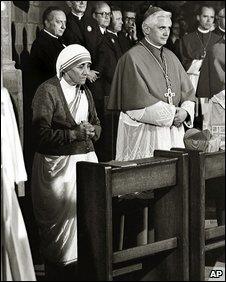
As cardinal, Joseph Ratzinger was a prominent figure under John Paul II
He was named Cardinal of Munich by Pope Paul VI in 1977.
At the age of 78, Joseph Ratzinger was the oldest cardinal to become Pope since Clement XII was elected in 1730.
It was always going to be difficult living up to his charismatic predecessor.
"If John Paul II had not been Pope, he would have been a movie star; if Benedict had not been Pope, he would have been a university professor," wrote US Vatican expert John L Allen.
He has a reputation as a theological conservative, taking uncompromising positions on homosexuality, women priests and contraception.
He espouses Christian compassion - speaking out for human rights, protection of the environment and the fight against poverty and injustice.
A central theme of his papacy has been his defence of fundamental Christian values in the face of what he sees as moral decline across much of Europe.
He has confounded those who expected him to appoint hardline traditionalists to key posts.
But the conclave of cardinals, which will elect his successor, is now dominated by Benedict's appointees, and has a bias towards European, and particularly Italian, clerics.
Benedict is described by those who know him as laidback, with a mild and humble manner, but with a strong moral core.
One cardinal put it another way, calling him "timid but stubborn".
Absolute truth
Cardinal Cormac Murphy O'Connor, the former head of the Church in England and Wales, says he is "unfailingly courteous" and has many talents, but administration is not one of them.
An embarrassing leak of documents from the Pope's desk revealing corruption and mismanagement inside the Vatican led to the conviction of his butler. The affair gave a damaging impression of a power struggle at the Holy See.
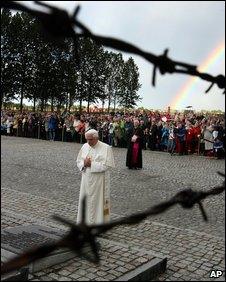
Benedict visited Auschwitz in 2006 to pray for the dead of the Holocaust
The former pope's handling of the child abuse scandals also attracted stinging criticism from the secular press.
And he managed to offend Muslims, Jews, and Protestants with his actions and speeches.
Supporters argued such incidents misrepresented his avowed intention of improving inter-faith relations.
He reached out, visiting the Blue Mosque in Istanbul, and the Dome of the Rock in Jerusalem, and praying for peace at the Western Wall.
Even so, questions were raised about those who advised Benedict, and their attention to public relations - leading, eventually, to the appointment of a former Fox News correspondent, Greg Burke, to head the Vatican's communications strategy.
For Benedict, public relations gaffes may only have been fleeting concerns compared with the serious long-term challenges for the Church - the falling away from the Church of millions of Catholics, and the decline in numbers of priests being recruited in the West.
He always believed that the strength of the Church came from an absolute truth that does not bend with the winds.
That approach disappointed those who felt the Church needed to modernise and despaired of his intransigence on priestly celibacy or condoms.
But his supporters believed that was exactly why he was the man to lead the Church through such challenging times.